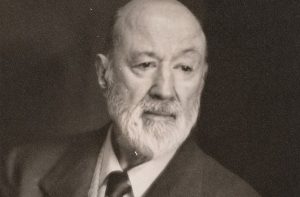Charles Ives is a difficult pill to swallow. As a student studying music composition, I have been confronted with Ives and the larger body of atonal music he contributed to on several occasions; its merits as a stylistic choice, its place in academic circles, and whether to incorporate it into my own music. Each time I look at his work and read his thoughts on the arts, his philosophy towards music, and his demeanor in discussing it, his rhetoric perpetuates my disdain towards him.
The Selected Correspondence of Charles Ives includes an exchange of letters between Ives and Henry H. Bellamann, a music critic who in April of 1921 receives a copy of Ives’ second piano sonata (1). He conveys in a letter his enjoyment of the piece, his plans to include it in his lectures, and requests for more information on Ive’s first piano sonata to relay it to audiences.
In Ives’ response to his letter, he gives Bellamann advice on possible ways to include Concord Sonata in his lecture and conveys his curiosity about how audiences react. He says “The first movements I find are severe tests for the listener as well as the player” (2). This statement could not possibly be more descriptive of the 17-minute-long first movement of his second piano Sonata, titled “Emerson” (3). His word choice, describing his music as a “test”, irks me in every wrong way imaginable. With this, he implies that listening to the movement is a rite of passage that denotes a listener or musician’s value.
Ives also appears to have the temperament or insecurity of a child (probably both). Ives receives a letter from colleague Percy Goetschius. While Goetschius makes clear his interest in Ives’ work, he does not withhold his criticism. As Goetschius states that “to my mind, these classic methods are correct ones [Ives adds between the lines ‘for soft eared cissies and aural cowards…” (4). While this does display a lack of impulse control and reveals deep insecurities about himself, this also suggests that Ives views his music as impervious to criticism, so much so he would rather write this intrusive thought down than keep it to himself.
We have talked a lot in class about the identity of American music. There is no denying the fact that Ives’ music is American. He was a composer who lived and worked in the United States, attempting to pioneer his own brand of music, so debating this is irrelevant. The question that remains is whether Ive’s music – and his contributions to atonal music – is something we want to perpetuate in the present day. If we answer this question from the perspective of the general public the answer is laid bare. The general public likely has no interest in performing his music, as seen with trends in popular music.
However, academic circles appear to be interested in continuing to engage with Ive’s music, as seen in courses that equip students to analyze post-tonal music, and new composers building upon Ive’s harmonic language in chamber and orchestral settings. If academic institutions choose to identify Ive’s work as a vital contribution to American western-classical music and worthwhile building upon, they must acknowledge that doing so deepens (both consciously and subconsciously) notions of self-deserving elitism, and encourages others to be recalcitrant to criticism of their work.
(1) Owens, Tom C, and Tom C Owens. 2007. Selected Correspondence of Charles Ives. 1st ed. Berkeley: University of California Press. https://doi.org/10.1525/j.ctt1ppr8v.
(2) Pg 84. Owens, Tom C, and Tom C Owens. 2007. Selected Correspondence of Charles Ives. 1st ed. Berkeley: University of California Press. https://doi.org/10.1525/j.ctt1ppr8v.
(3) Ives, Charles. n.d. “IVES: Piano Sonata No. 2 ‘Concord, Mass’ (Henck)”. Hong Kong: Naxos Digital Services US Inc.
(4) pg 67. Ives, Charles. n.d. “IVES: Piano Sonata No. 2 ‘Concord, Mass’ (Henck)”. Hong Kong: Naxos Digital Services US Inc.

